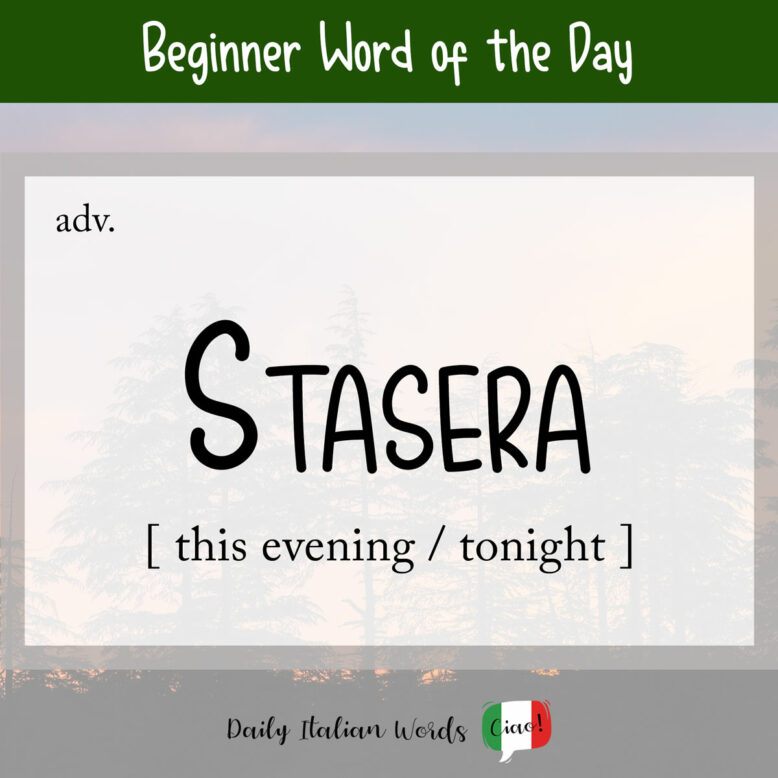Stasera, meaning this evening, is one of the very first and most essential adverbs of time you’ll encounter when delving into the Italian language.
It is the combination of the adjective questa (this), with the removal of the initial que-, and sera (evening).
stasera
this evening

In everyday conversation, stasera is used more commonly than questa sera, simply for its brevity and convenience. However, there’s absolutely nothing wrong with using the complete expression when you prefer.
Stasera / Questa sera ha piovuto tantissimo!
It rained a lot this evening.
Before delving any deeper into stasera, it is essential to mention that the noun sera can be translated, not only as evening, but also night. This is because sera actually denotes the period of time from late afternoon until when you go to bed.
For instance, the sentence “I want to dance all night!” can appropriately be translated as either “Voglio ballare tutta la sera!” or “Voglio ballare tutta la notte!” Opting for the former suggests the speaker will go to bed at some point, while the latter implies they won’t be going to sleep at all.
So, how does this affect our translation of stasera? Well, it’s simple: in certain contexts, it can also mean “tonight“!
Penso che tornerò a casa tardi stasera.
I think I’ll be coming home late tonight.

The same principle applies to morning (“mattina“) and night (“notte“), but when it comes to the afternoon (“pomeriggio“), the two words should remain separate. You might come across ‘sto pomeriggio, with questo abbreviated to ‘sto, but please note that it’s very informal. In most cases, people will say oggi pomeriggio (literally “today afternoon”) to mean this afternoon.
- mattina (morning) → questa mattina, stamattina, stamani, stamane (this morning)
- pomeriggio (afternoon) → questo pomeriggio, ‘sto pomeriggio, oggi pomeriggio (this afternoon)
- notte (night) → questa notte, stanotte (tonight)
Some additional adverbs of time that derive from sera include ieri sera (yesterday evening / last night), domani sera (tomorrow evening / night), l’altra sera (the other evening / night) and venerdì sera (Friday evening / night).
Se non vado in ufficio stasera, dovrò andarci domani.
If I don’t go to the office this evening, I’ll have to go tomorrow.

To wrap up, I’d like to introduce a song by one of Italy’s most renowned contemporary singer-songwriters, Marco Mengoni. He shot to fame in 2009, clinching the top spot in the third season of the Italian talent show “X Factor.” The song is titled Ma stasera (“But tonight”).
Heather Broster is a graduate with honours in linguistics from the University of Western Ontario. She is an aspiring polyglot, proficient in English and Italian, as well as Japanese, Welsh, and French to varying degrees of fluency. Originally from Toronto, Heather has resided in various countries, notably Italy for a period of six years. Her primary focus lies in the fields of language acquisition, education, and bilingual instruction.


